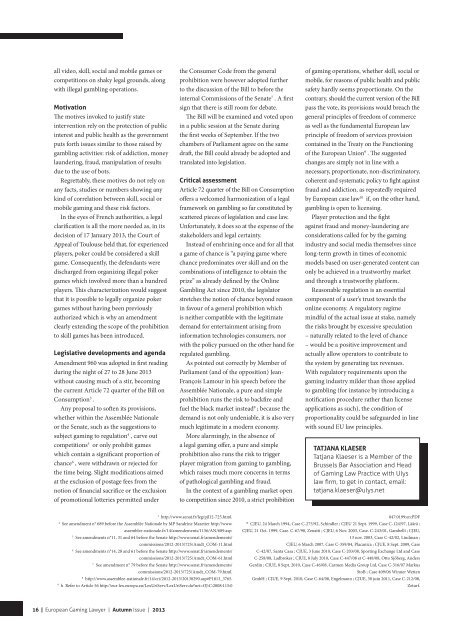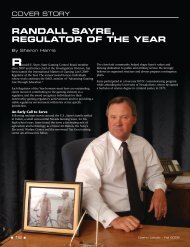View current issue (PDF) - International Masters of Gaming Law
View current issue (PDF) - International Masters of Gaming Law
View current issue (PDF) - International Masters of Gaming Law
Create successful ePaper yourself
Turn your PDF publications into a flip-book with our unique Google optimized e-Paper software.
all video, skill, social and mobile games orcompetitions on shaky legal grounds, alongwith illegal gambling operations.MotivationThe motives invoked to justify stateintervention rely on the protection <strong>of</strong> publicinterest and public health as the governmentputs forth <strong>issue</strong>s similar to those raised bygambling activities: risk <strong>of</strong> addiction, moneylaundering, fraud, manipulation <strong>of</strong> resultsdue to the use <strong>of</strong> bots.Regrettably, these motives do not rely onany facts, studies or numbers showing anykind <strong>of</strong> correlation between skill, social ormobile gaming and these risk factors.In the eyes <strong>of</strong> French authorities, a legalclarification is all the more needed as, in itsdecision <strong>of</strong> 17 January 2013, the Court <strong>of</strong>Appeal <strong>of</strong> Toulouse held that, for experiencedplayers, poker could be considered a skillgame. Consequently, the defendants weredischarged from organizing illegal pokergames which involved more than a hundredplayers. This characterization would suggestthat it is possible to legally organize pokergames without having been previouslyauthorized which is why an amendmentclearly extending the scope <strong>of</strong> the prohibitionto skill games has been introduced.Legislative developments and agendaAmendment 960 was adopted in first readingduring the night <strong>of</strong> 27 to 28 June 2013without causing much <strong>of</strong> a stir, becomingthe <strong>current</strong> Article 72 quarter <strong>of</strong> the Bill onConsumption 3 .Any proposal to s<strong>of</strong>ten its provisions,whether within the Assemblée Nationaleor the Senate, such as the suggestions tosubject gaming to regulation 4 , carve outcompetitions 5 or only prohibit gameswhich contain a significant proportion <strong>of</strong>chance 6 , were withdrawn or rejected forthe time being. Slight modifications aimedat the exclusion <strong>of</strong> postage fees from thenotion <strong>of</strong> financial sacrifice or the exclusion<strong>of</strong> promotional lotteries permitted underthe Consumer Code from the generalprohibition were however adopted furtherto the discussion <strong>of</strong> the Bill to before theinternal Commissions <strong>of</strong> the Senate 7 . A firstsign that there is still room for debate.The Bill will be examined and voted uponin a public session at the Senate duringthe first weeks <strong>of</strong> September. If the twochambers <strong>of</strong> Parliament agree on the samedraft, the Bill could already be adopted andtranslated into legislation.Critical assessmentArticle 72 quarter <strong>of</strong> the Bill on Consumption<strong>of</strong>fers a welcomed harmonization <strong>of</strong> a legalframework on gambling so far constituted byscattered pieces <strong>of</strong> legislation and case law.Unfortunately, it does so at the expense <strong>of</strong> thestakeholders and legal certainty.Instead <strong>of</strong> enshrining once and for all thata game <strong>of</strong> chance is “a paying game wherechance predominates over skill and on thecombinations <strong>of</strong> intelligence to obtain theprize” as already defined by the OnlineGambling Act since 2010, the legislatorstretches the notion <strong>of</strong> chance beyond reasonin favour <strong>of</strong> a general prohibition whichis neither compatible with the legitimatedemand for entertainment arising frominformation technologies consumers, norwith the policy pursued on the other hand forregulated gambling.As pointed out correctly by Member <strong>of</strong>Parliament (and <strong>of</strong> the opposition) Jean-François Lamour in his speech before theAssemblée Nationale, a pure and simpleprohibition runs the risk to backfire andfuel the black market instead 8 ; because thedemand is not only undeniable, it is also verymuch legitimate in a modern economy.More alarmingly, in the absence <strong>of</strong>a legal gaming <strong>of</strong>fer, a pure and simpleprohibition also runs the risk to triggerplayer migration from gaming to gambling,which raises much more concerns in terms<strong>of</strong> pathological gambling and fraud.In the context <strong>of</strong> a gambling market opento competition since 2010, a strict prohibition<strong>of</strong> gaming operations, whether skill, social ormobile, for reasons <strong>of</strong> public health and publicsafety hardly seems proportionate. On thecontrary, should the <strong>current</strong> version <strong>of</strong> the Billpass the vote, its provisions would breach thegeneral principles <strong>of</strong> freedom <strong>of</strong> commerceas well as the fundamental European lawprinciple <strong>of</strong> freedom <strong>of</strong> services provisioncontained in the Treaty on the Functioning<strong>of</strong> the European Union 9 . The suggestedchanges are simply not in line with anecessary, proportionate, non-discriminatory,coherent and systematic policy to fight againstfraud and addiction, as repeatedly requiredby European case law 10 if, on the other hand,gambling is open to licensing.Player protection and the fightagainst fraud and money-laundering areconsiderations called for by the gamingindustry and social media themselves sincelong-term growth in times <strong>of</strong> economicmodels based on user-generated content canonly be achieved in a trustworthy marketand through a trustworthy platform.Reasonable regulation is an essentialcomponent <strong>of</strong> a user’s trust towards theonline economy. A regulatory regimemindful <strong>of</strong> the actual <strong>issue</strong> at stake, namelythe risks brought by excessive speculation– naturally related to the level <strong>of</strong> chance– would be a positive improvement andactually allow operators to contribute tothe system by generating tax revenues.With regulatory requirements upon thegaming industry milder than those appliedto gambling (for instance by introducing anotification procedure rather than licenseapplications as such), the condition <strong>of</strong>proportionality could be safeguarded in linewith sound EU law principles.TATJANA KLAESERTatjana Klaeser is a Member <strong>of</strong> theBrussels Bar Association and Head<strong>of</strong> <strong>Gaming</strong> <strong>Law</strong> Practice with Ulyslaw firm, to get in contact, email:tatjana.klaeser@ulys.net3http://www.senat.fr/leg/pjl12-725.html.4See amendment n° 689 before the Assemblée Nationale by MP Sandrine Mazetier http://www.assemblee-nationale.fr/14/amendements/1156/AN/689.asp.5See amendments n°11, 31 and 64 before the Senate http://www.senat.fr/amendements/commissions/2012-2013/725/Amdt_COM-11.html6See amendments n°14, 28 and 61 before the Senate http://www.senat.fr/amendements/commissions/2012-2013/725/Amdt_COM-61.html7See amendment n° 79 before the Senate http://www.senat.fr/amendements/commissions/2012-2013/725/Amdt_COM-79.html.8http://www.assemblee-nationale.fr/14/cri/2012-2013/20130290.asp#P1813_3765.9h Refer to Article 56 http://eur-lex.europa.eu/LexUriServ/LexUriServ.do?uri=OJ:C:2008:115:0047:0199:en:<strong>PDF</strong>10CJEU, 24 March 1994, Case C-275/92, Schindler ; CJEU 21 Sept. 1999, Case C-124/97, Läärä ;CJEU, 21 Oct. 1999, Case. C-67/98, Zenatti ; CJEU, 6 Nov. 2003, Case. C-243/01, Gambelli ; CJEU,13 nov. 2003, Case C-42/02, Lindman ;CJEU, 6 March 2007, Case C-359/04, Placanica ; CJUE, 8 Sept. 2009, CaseC-42/07, Santa Casa ; CJUE, 3 June 2010, Case C-203/08, Sporting Exchange Ltd and CaseC-258/08, Ladbrokes ; CJUE, 8 July 2010, Case C-447/08 et C-448/08, Otto Sjöberg, AndersGerdin ; CJUE, 8 Sept. 2010, Case C-46/08, Carmen Media Group Ltd, Case C-316/07 MarkusStoB ; Case 409/06 Winner WettenGmbH ; CJUE, 9 Sept. 2010, Case C-64/08, Engelmann ; CJUE, 30 juin 2011, Case C-212/08,Zeturf.16 | European <strong>Gaming</strong> <strong>Law</strong>yer | Autumn Issue | 2013



